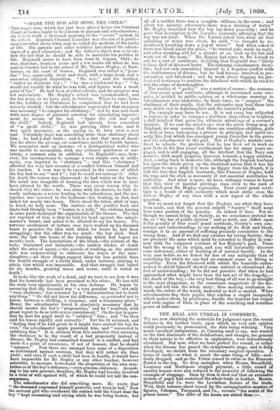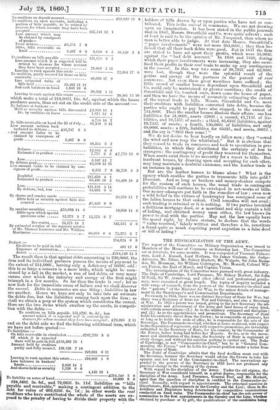THE REAL AND UNREAL IN COMMERCE.
WE are now obtaining the materials for judgment upon the recent failures in the leather trade, upon which no very safe opinion could previously be pronounced, the data being wanting. Very much excellent indignation, as Canning used to say, was wasted on the first disclosure of the defalcations, and charges, too general in their nature to be effective in application, were industriously circulated. But now, when we have probed the wound, or rather when the disease has passed the symptomatic stage, and is fully developed, we shrink from the necessary surgical operation. A. house of cards—or what is much the same thing, of bills—sud- denly dropped, and.as the Triton ceased to swim so the Minnows se floated to the top. To drop metaphor, when Messrs. Streatfeild, Laurence and Mortimore stopped payment, a little crowd of smaller houses were also reduced to the necessity of following the example of stoppage. Item by item it eked out that an extensive system of paper had sustained the whole trade in leather. Messrs. Streatfeild and Co. were the Leviathan factors of the trade. Well, their balance-sheet issued by the unimaginative masters of figures, Coleman, Turquand, and Co., reveals "the secret of the prison-house." The debts of the house are stated thus :—
To creditors on deposit account To creditors on open accounts, including a portion of bills payable, to be retired by drawers for whose account they have been
£68,820 19 8 accepted £67,148 12 1
Less amount which may be claimed by consignors of goods-
From debtors £6,551 7 8
Ditto, bills receivable on
hand 2,467 0 9 9,018 8 5 58,130 3 8 To creditors on bills payable 151,678 0 5
Less amount which it is expected will be retired by drawers for whose account they have been accepted 79,083 2 11
Leaving to rank against this estate
72,594 17 6 40,693 17 9 To creditors, partly secured for loans on bills receivable
Less estimated value of bills held 18,483 11 11
And cash balances in hand 1,848 10 0
20,332 1 11
Leaving to rank against this estate
20,361 15 10
which make a total of 219,9071. 16s. 8d., agaiust which the house
produces assets, thus set out on the credit side of the account :- By balance at bankers :-
Held as security against bills discounted £2,838 18 1
Do. by creditors on loans 1,871 12 6
4,710 10 7
By bills receivable on hand the 2d of July 61,158 8 11
Less amount written back
included in debtors £45,747 2 5 And amount liable to be
claimed by consignors of goods 2,467 0 9
48,214 3 2
Balance 12,944 5 9
Estimated to produce
7,776 2 2
£7,776 12 0
Loss 5,167 13 7
By debtors good 43,350 12 11
Less amount liable to be claimed by con- signors of goods 6,551 7 8
36,799 5 3
Doubtful 217,670 4 1
Estimated to produce 66,499 18 2
66,499 18 2
Loss 151,170 5 11
By debtors, bad, loss 34,683 9 6
By shares and sundry assets
20,376 12 7 Ditto held as security against bills dis- counted £1,320 0 0
By surplus securities £10,898 14 6
10,898 14 6 Ditto upon which special
questions arise 12,273 3 7
12,273 3
7
See contra 23,171 18 1
142,351 2 8 By estimated surplus of the separate estates of Mr. Thomas Laurence and Mr. William
Mortimore 60,000 0 0 72,273 3 7
214,624 6 3
DeductDeduct:-
Creditors to be paid in full of realization....
483 12 0
Expenses £ Assets
£214,140 14 3 The result then is that against debts amounting to 220,0001. the firm and its individual partners possess the means of payment to the extent of 214,0001., leaving only a deficiency of 6000/. odd : this to so large a concern is a mere trifle, which might be occa- sioned by a fall in the market, a run of bad debts, or very many causes over which the industry and energy of the firm might triumph in a few months. So far then the trade is real ; let us now look for the immediate cause of failure and we shall discover the unreal. Debts in commerce are one thing ; liabilities in law are another. Hence we have not only to take into an estimate the debts due, but the liabilities coming back upon the firm ; so shall we obtain a peep at the system which constitutes the unreal. Here are the two items which swallow up the assets, in competi- tion with the debts :- To creditors on bills payable 151,6781. Os. 5d., less
amount which it is expected will be retired by the
drawers for whose account they have been accepted.. £79,083 2 11 and on the debit side we find the following additional item, which we have not before quoted:- To liabilities:-
On bills receivable in circulation
Of which it is expected
£767,730 8 8
there will be paid in full.£110,502 19 1
Amount held by creditors partly and hilly secured. 138,528 7 10
249,031 6 11
Leasing to rank against this estate
518,699 1 9
Less balances iu bankers' hands 2,838 18 1
And shares held as security 1,320 0
0
4,158 18 1
L514,540 3 8
10,000
To liability on notes of hand 0 0 524,5401. 3s. Sd., and 79,0831. 2s. 11d. liabilities on "bills payable and receivable," making a contingent addition to the debt for value of 603,6231. 6s. 7d.; in other words the real creditors who have contributed the whole of the assets are ex- posed to the penalty of having to divide their property with the holders of bills drawn by or upon parties who have not so con- tributed. This is the unreal in commerce. We are not drawing upon an imagination. It has been stated in the public journals that in 1857, Messrs. Streatfeild and Co. were quite solvent ; such at least is said to be the opinion of Mr. Turquand, than whom no man is better able to judge. At that date Messrs. Streatfeild's " paper involvements" were not more 365,000/. ; they then be- lieved that all their book debts were good. But in 1857 the firm are stated to have set apart their profits, which were 33,983/. against the " bad debt account." In 1858 and 1859, during which their paper involvements were increasing, they also sacri- ficed their profits in their real trade to make up any contingency in the unreal. In this way two sums of 39,7921. and 42,8301. were lost, though they were the splendid result of the genius and energy of the partners in the pursuit of real commerce. Not even these great sacrifices have sufficed ; the little crowd of smaller houses dependant upon Streatfeild and Co. could only be maintained by greater sacrifices ; the credit of Streatfeild and Co. touched once, down came the house of paper, and then we have the means of accurately estimating the extent of the unreal trade in bills. Messrs. Streatfeild. and Co. meet their creditors with liabilities converted into debts, because the parties who ought to pay have also stopped, to the extent of 744,0001. Then the smaller houses disclose their affairs : one has liabilities for 31,0001., assets 5200/. ; a second; 43,7151. of lia- bilities, and 10,757/. of assets ; a third, 46,6161. liabilities, against 19,733l. of assets ; a fourth, 150,0001. of liabilities, and only 40,000/. assets ; a fifth, liabilities for 65221., and assets, 36611. ; and the cry is " Still they come "
We do not desire to bear hardly on fallen men ; they "sowed the wind and now reap the whirlwind." But it is obvious that they ceased to trade in commerce-and took to speculation in pro- babilities, in which they distributed the certainty of loss to strangers ; the contingency of profit they reserved for themselves. When assets exist there is no necessity for a resort to bills. But insolvent houses, by drawing upon and accepting for each other, may long maintain a doubtful existence, and the leather trade la an instance in point.
But are the leather houses to blame alone ? What is the agency which enables the parties to transmute bills into gold ? Discount. And so long as bankers and money-dealers compete for the custom of such houses, the usual trade in contingent probabilities will continue to be enveloped in net-works of bills. Our money-changers put faith in the remedies of law ; even now a wild belief in the virtues of bankruptcy has consigned some of the fallen houses to that ordeal. Civil remedies will not avail ; such trading is criminal or it is nothing. If two parties invented a fictitious mortgage deed, or a merchant and ship captain a bill
of lading, and obtained money upon either, the law knows its power to deal with the parties. May not the law equally have the moral right, by future statute, to declare that the words
" value received," falsely written and therefore a lie, constitute a fraud quite as much requiring penal expiation as a false deed or bill of lading ?



























 Previous page
Previous page